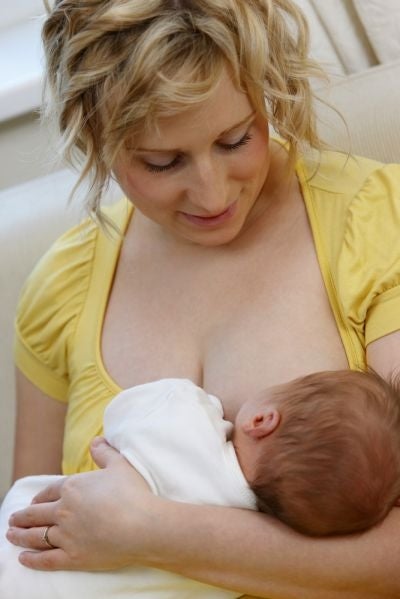Your support helps us to tell the story
From reproductive rights to climate change to Big Tech, The Independent is on the ground when the story is developing. Whether it's investigating the financials of Elon Musk's pro-Trump PAC or producing our latest documentary, 'The A Word', which shines a light on the American women fighting for reproductive rights, we know how important it is to parse out the facts from the messaging.
At such a critical moment in US history, we need reporters on the ground. Your donation allows us to keep sending journalists to speak to both sides of the story.
The Independent is trusted by Americans across the entire political spectrum. And unlike many other quality news outlets, we choose not to lock Americans out of our reporting and analysis with paywalls. We believe quality journalism should be available to everyone, paid for by those who can afford it.
Your support makes all the difference.Breastfeeding exclusively for the first six months is not necessarily best for a baby's health, British researchers said Friday, calling into question advice given to new mothers.
The team led by a paediatrician from University College London said babies fed only breast milk could suffer iron deficiency and may be more prone to allergies.
The study says babies could start to be weaned on to solids as early as four months, although other experts advised sticking to the existing guidelines.
Ten years ago, the World Health Organisation (WHO) recommended that infants should be exclusively breastfed for six months.
"Many Western countries, including 65 percent of European member states and the United States, elected not to follow this recommendation fully, or at all," the authors said, although Britain did.
The WHO recommendation "rested largely" on a review of 16 studies, including seven from developing countries.
It concluded that babies given only breast milk for six months had fewer infections and experienced no growth problems.
But another review of 33 studies found "no compelling evidence" not to introduce solids at four to six months, the experts said.
Some studies have also shown that breastfeeding for six months fails to give babies all the nutrition they need.
One US study from 2007 found that babies exclusively breastfed for six months were more likely to develop anaemia than those introduced to solids at four to six months.
On the issue of allergies, the British study said researchers in Sweden found that the incidence of early onset coeliac disease increased after a recommendation to delay introduction of gluten until age six months, "and it fell to previous levels after the recommendation reverted to four months".
The authors said however that exclusively breastfeeding for six months remains the best recommendation for developing countries, which have higher death rates from infection.
But in developed countries, it could lead to adverse health outcomes and may "reduce the window for introducing new tastes".
"Bitter tastes, in particular, may be important in the later acceptance of green leafy vegetables, which may potentially affect later food preferences with influence on health outcomes such as obesity."
The researchers said the European Food Safety Authority's panel on dietetic products, nutrition and allergies has concluded that for infants across the EU, complementary foods may be introduced safely between four to six months.
Experts in Britain challenged the findings of the new study.
Janet Fyle, professional policy adviser at the Royal College of Midwives, said: "I really must challenge the suggestion from the review that the UK should reconsider its current advice on exclusive breastfeeding for six months.
"I believe that this is a retrograde step and plays into the hands of the baby food industry which has failed to support the six-month exclusive breastfeeding policy in the UK."
gj/rjm/mb

Join our commenting forum
Join thought-provoking conversations, follow other Independent readers and see their replies
Comments